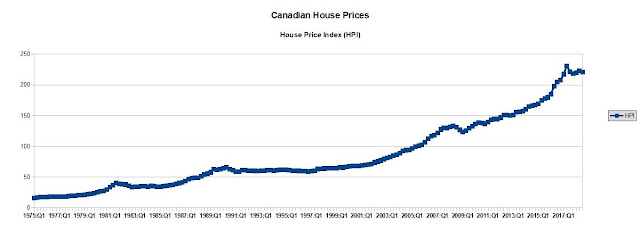Eight months ago, we speculated that the Canadian Property Market was due for a bust.
Today, that reality has come ever closer. So far, as of the third quarter of 2018, property prices have
declined by 4.24% since they peaked in the second quarter of 2017.
Property Prices have also leapfrogged incomes so much that the
relationship of Property Prices to Income is way out of whack. On
average, the ratio of Real House Prices to Real Personal Disposable
Income (data from the International House Price Database
maintained by the Dallas Federal Reserve) since 1975 has been 95% of
Real Personal Disposable Income with a Standard Deviation of 19%. As
of the 3rd qtr of 2018, Real House Prices now stand at 142% of Real
Personal Disposable Income. This represents more than 2 Standard
Deviations above the historical mean. Assuming a normal distribution,
there is only a 1.3% probability that the property market could go even
higher. If Real House Prices revert to the mean, as they often do, Canada could be in for a property decline of 33.58% from current
levels. But markets always tend to overshoot to the downside. If the real estate
boom of the past two decades caused prices to surge way past anything
that reflect fundamentals, a panic could set in on the downside and
cause prices to drop to levels not seen in a generation.
How Overheated are the Real Estate Markets of Canada, Australia, and New Zealand?
Search This Blog
Tuesday, January 15, 2019
Monday, January 14, 2019
How low can Australian Property Prices Go? Let Me Count the Ways
Almost three years ago, we speculated that the Australian Property Market was due for a bust. Today, that reality has come ever closer. So far, property prices have declined for all three quarters of 2018, peaking in the fourth quarter of 2017. But the decline is marginal - only a shade less than 3% (2.86% to be exact) and may represent a slowdown than an actual property bust.
Australian Property Prices are still way above their their inflation adjusted basis since year-end 2002. If property prices were to drop to their inflation adjusted levels, they would drop by an astounding 42.29%!.
Property Prices have also leapfrogged incomes so much that the relationship of Property Prices to Income is way out of whack. On average, the ratio of Real House Prices to Real Personal Disposable Income (data from the International House Price Database maintained by the Dallas Federal Reserve) since 1975 has been 80% of Real Personal Disposable Income with a Standard Deviation of 21.91%. As of the 2nd qtr of 2018, Real House Prices now stand at 128.48% of Real Personal Disposable Income. This represents more than 2 Standard Deviations above the historical mean. Assuming a normal distribution, there is only a 1.4% probability that the property market could go even higher. If Real House Prices revert to the mean, as they often do, Australia could be in for a property decline of 37.39% from current levels.
Both calculations, inflation-adjusted basis or by income-adjusted basis, predict a severe decline (more than 30%). But markets always tend to overshoot to the downside. If the real estate boom of the past two decades caused prices to surge way past anything that reflect fundamentals, a panic could set in on the downside and cause prices to drop to levels not seen in a generation.
How Overheated are the Real Estate Markets of Canada, Australia, and New Zealand?
Australian Property Prices are still way above their their inflation adjusted basis since year-end 2002. If property prices were to drop to their inflation adjusted levels, they would drop by an astounding 42.29%!.
Property Prices have also leapfrogged incomes so much that the relationship of Property Prices to Income is way out of whack. On average, the ratio of Real House Prices to Real Personal Disposable Income (data from the International House Price Database maintained by the Dallas Federal Reserve) since 1975 has been 80% of Real Personal Disposable Income with a Standard Deviation of 21.91%. As of the 2nd qtr of 2018, Real House Prices now stand at 128.48% of Real Personal Disposable Income. This represents more than 2 Standard Deviations above the historical mean. Assuming a normal distribution, there is only a 1.4% probability that the property market could go even higher. If Real House Prices revert to the mean, as they often do, Australia could be in for a property decline of 37.39% from current levels.
Both calculations, inflation-adjusted basis or by income-adjusted basis, predict a severe decline (more than 30%). But markets always tend to overshoot to the downside. If the real estate boom of the past two decades caused prices to surge way past anything that reflect fundamentals, a panic could set in on the downside and cause prices to drop to levels not seen in a generation.
How Overheated are the Real Estate Markets of Canada, Australia, and New Zealand?
Subscribe to:
Posts (Atom)




